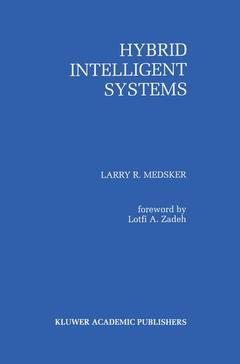Hybrid Intelligent Systems, Softcover reprint of the original 1st ed. 1995
Langue : Anglais
Auteur : Medsker Larry R.

Hybrid Intelligent Systems summarizes the strengths and weaknesses of five intelligent technologies: fuzzy logic, genetic algorithms, case-based reasoning, neural networks and expert systems, reviewing the status and significance of research into their integration. Engineering and scientific examples and case studies are used to illustrate principles and application development techniques. The reader will gain a clear idea of the current status of hybrid intelligent systems and discover how to choose and develop appropriate applications. The book is based on a thorough literature search of recent publications on research and development in hybrid intelligent systems; the resulting 50-page reference section of the book is invaluable.
The book starts with a summary of the five major intelligent technologies and of the issues in and current status of research into them. Each subsequent chapter presents a detailed discussion of a different combination of intelligent technologies, along with examples and case studies. Four chapters contain detailed case studies of working hybrid systems. The book enables the reader to:
The book starts with a summary of the five major intelligent technologies and of the issues in and current status of research into them. Each subsequent chapter presents a detailed discussion of a different combination of intelligent technologies, along with examples and case studies. Four chapters contain detailed case studies of working hybrid systems. The book enables the reader to:
- Describe the important concepts, strengths and limitations of each technology;
- Recognize and analyze potential problems with the application of hybrid systems;
- Choose appropriate hybrid intelligent solutions;
- Understand how applications are designed with any of the approaches covered;
- Choose appropriate commercial development shells or tools. An invaluable reference source for those who wish to apply intelligent systems techniques to their own problems.
1 Overview of Intelligent Systems.- 1.1 Expert Systems.- 1.2 Neural Networks.- 1.3 Fuzzy Systems.- 1.4 Genetic Algorithms.- 1.5 Case-Based Reasoning.- 1.6 Intelligent Information Systems.- 1.7 Summary.- 1.8 References for Further Reading.- 2 Research in Hybrid Intelligent Systems.- 2.1 Models for Integrating Intelligent Systems.- 2.2 Hybrid Reasoning — Issues and Research Areas.- 2.3 Development Tools.- 2.4 Future of Research and Development.- 2.5 References for Further Reading.- 3 Expert Systems and Neural Networks.- 3.1 Expert System and Neural Network Technologies.- 3.2 Hybrid Neural Network and Expert Systems.- 3.3 Development Tools and Environments.- 3.4 Conclusions and Assessment of the Future.- 3.5 References for Further Reading.- 4 Industrial Experience: The Use of Hybrid Systems in the Power Industry.- 4.1 The Changing Face of the Power Industry in the United Kingdom.- 4.2 Artificial Intelligence in the Power Industry.- 4.3 Blyth Power Station.- 4.4 Condition Monitoring.- 4.5 The Application of Hybrid Systems in Condition Monitoring.- 4.6 Other Applications in the Power Industry.- 4.7 Conclusions.- 4.8 References for Further Reading.- 5 Expert Networks.- 5.1 Introduction.- 5.2 The Translation Process.- 5.3 Training for Performance.- 5.4 The Wine Advisor.- 5.5 The Control Chart Selection Advisor.- 5.6 Conclusions.- 5.7 References for Further Reading.- 6 Fuzzy Logic and Expert Systems.- 6.1 Characteristics of Expert Systems and Fuzzy Logic.- 6.2 Survey of Research and Development.- 6.3 Examples of Fuzzy Expert Systems.- 6.4 Intelligent Tutoring System.- 6.5 Fuzzy Control Systems.- 6.6 Development Tools and Environments.- 6.7 Summary.- 6.8 References for Further Reading.- 7 Fuzzy Systems and Neural Networks.- 7.1 Synergistic Features of Fuzzy Systems and NeuralNetworks.- 7.2 Summary of Research and Development Work.- 7.3 Development Systems.- 7.4 Summary and Guidelines.- 7.5 References for Further Reading.- 8 Genetic Algorithms and Neural Networks.- 8.1 Synergistic Characteristics.- 8.2 Summary of Research and Development Work.- 8.3 Examples Integrated Genetic Algorithms and Neural Networks.- 8.4 Development Systems.- 8.5 Summary and Guidelines.- 8.6 References for Further Reading.- 9 Applications Using Hybrid Neural Networks with Fuzzy Logic and Genetic Algorithms.- 9.1 Introduction.- 9.2 Hybrid Neural Network-Fuzzy Logic Diagnosis System for Vibration Monitoring.- 9.3 Decision Fusion by Fuzzy Set Operations.- 9.4 Genetic Algorithms to Select Inputs to Neural Networks.- 9.5 Summary.- 9.5 References for Further Reading.- 10 Genetic Algorithms and Fuzzy Systems.- 10.1 Opportunities for Integration.- 10.2 Examples of Hybrid Genetic and Fuzzy Systems.- 10.3 Summary.- 10.4 References for Further Reading.- 11 Adaptive Control of an Exothermic Chemical Reaction System Using Fuzzy Logic and Genetic Algorithms.- 11.1 Introduction.- 11.2 The Physical System.- 11.3 Genetic Algorithms Differ from Other Search Procedures.- 11.4 The Mechanics of a Simple Genetic Algorithm.- 11.5 An Adaptive Hexamine GA-FLC.- 11.6 Summary and Conclusions.- 11.6 References for Further Reading.- 12 Genetic Algorithms and Expert Systems.- 12.1 Synergistic Characteristics.- 12.2 Examples of Hybrid Systems.- 12.3 Summary.- 12.4 References for Further Reading.- 13 Hybrid Systems with Case-Based Reasoning.- 13.1 Opportunities for Hybrid Systems.- 13.2 Case-Based Reasoning with Other Intelligent Technologies.- 13.3 Summary.- 13.4 References for Further Reading.- 14 Summary and the Future of Hybrid Intelligent Systems.- 14.1 Intelligent Technologies.- 14.2 HybridIntelligent Systems.- 14.3 Research and Development Directions.- 14.4 Conclusions.- 14.5 References for Further Reading.- General References.- Hybrid Systems with Case-Based Reasoning.- Expert Systems and Fuzzy Logic.- Expert Systems and Neural Networks.- Fuzzy Logic and Genetic Algorithms.- Fuzzy Logic and Neural Networks.- Genetic Algorithms and Neural Networks.- References.
' ... is very readable, with clear illustrations, and provides an insightful, informative, and up-to-date account of the basic ideas underlying hybrid intelligent systems. ... provides a good source for gaining a better understanding of hybrid systems.'Engineering Applications Artificial Intelligence, 10:1 (1996)
Date de parution : 10-2012
Ouvrage de 298 p.
15.5x23.5 cm
© 2024 LAVOISIER S.A.S.



